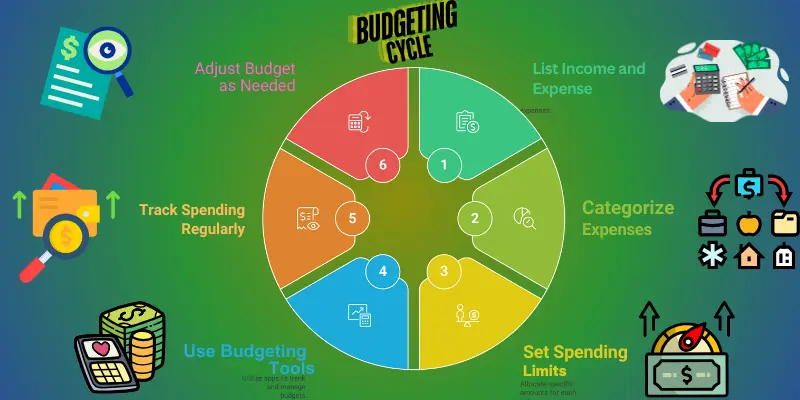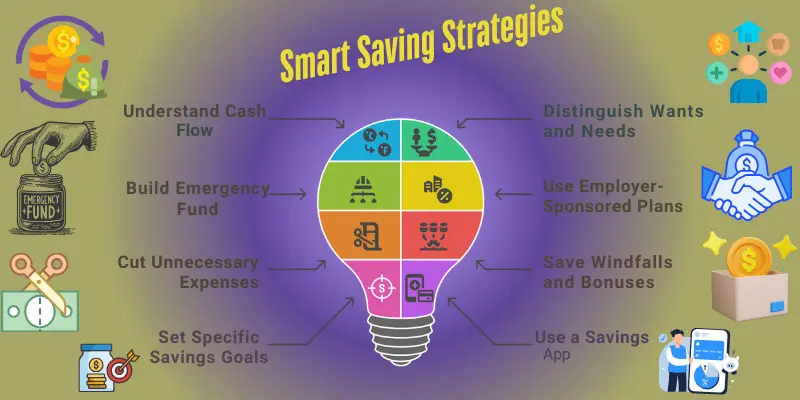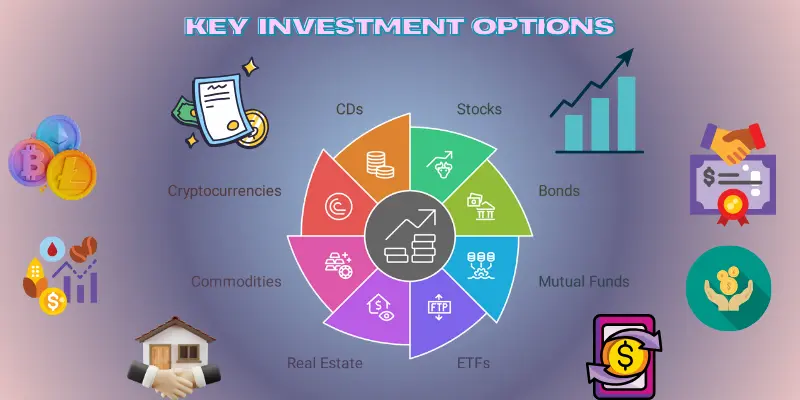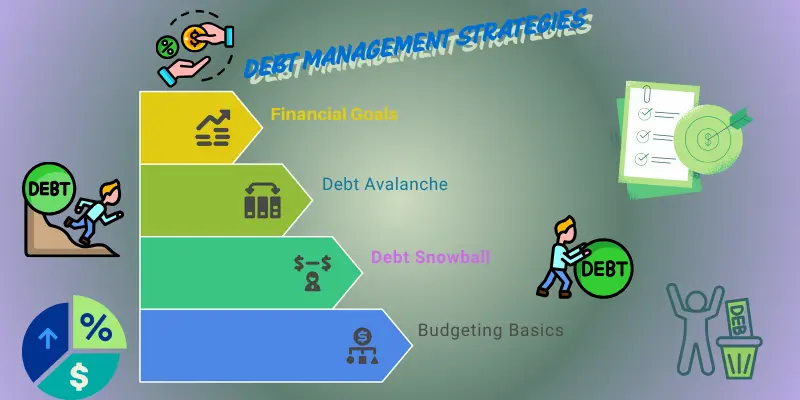Why Financial Wellness is Essential for Self-Care Today
Published: 26/03/2025
Are you feeling overwhelmed by work, family, and social obligations? You’re not alone. Financial uncertainty can affect your mental, emotional, and physical health. According to the 2023 Employee Financial Wellness Survey by PwC, 60% of full-time employees are stressed about their finances. Also, 47% of employees earning $100,000 or more per year are stressed about money. Managing your finances is more important than ever in today’s economy.
Imagine waking up without financial stress
Financial wellness isn’t just about money. It’s about reducing stress and gaining control. It’s about improving your overall well-being. Recognizing financial wellness as self-care can help you live a balanced and fulfilling life. Financial health can lead to better mental, emotional, and physical outcomes. It’s a key part of a holistic self-care routine. Ready to learn more? Read on to find out!
What is Financial Wellness? Your Path to Peace of Mind
Financial wellness means having control over your money. It involves budgeting, saving, managing debt, and planning for future financial needs.
Key Components of financial wellness
True financial wellness means freedom—from stress, debt, and uncertainty. It starts with smart budgeting, grows through consistent saving, and thrives with strategic investing.
Budgeting
Budgeting means planning how to spend your money each month. It helps you track income and expenses to ensure you live within your means and save for the future.

Benefits of Budgeting
- Helps control spending: Budgeting tracks your expenses and prevents overspending.
- Ensures you save for future needs: It allocates funds for savings and future financial goals.
- Reduces financial stress: Having a budget decreases money-related anxiety by providing a clear financial plan.
Steps to Create a Budget
- List your income and expenses: Track all sources of income and every expense you have.
- Categorize your expenses: Divide your spending into essential needs and discretionary wants.
- Set spending limits for each category: Allocate specific amounts for each expense category to control your spending.
Types of Budgeting Methods
- 50/30/20 Rule: Split income into 50% for needs, 30% for wants, and 20% for savings.
- Zero-Based Budgeting: Allocate every dollar of income for a specific purpose until nothing is left unassigned.
- Envelope System: Assign cash to different spending categories, using envelopes for each category.
Budgeting Tools and Apps
- Mint: Tracks your expenses, income, and budgets in one place.
- YNAB (You Need A Budget): Helps you allocate every dollar and manage your budget.
- PocketGuard: Shows how much money you have left after bills and savings.
Tips for Sticking to a Budget
- Track your spending regularly.
- Adjust your budget as needed.
- Avoid impulsive purchases.
Common Budgeting Mistakes to Avoid
- Not accounting for all expenses.
- Setting unrealistic goals.
- Failing to adjust the budget over time.
Saving
To achieve financial wellness, it’s important to adopt effective saving methods. Here are some practical and proven strategies to help you save money consistently:

- Understand Cash Flow: Regularly review your income and expenses to manage your finances effectively.
- Distinguish Between Wants and Needs: Prioritize essential expenses over non-essential ones to save more.
- Build an Emergency Fund: Save three to six months’ worth of living expenses for unexpected situations.
- Use Employer-Sponsored Plans: Take advantage of retirement plans like 401(k)s or IRAs, especially if your employer offers matching contributions.
- Cut Unnecessary Expenses: Identify and eliminate non-essential expenses, such as subscriptions or dining out, to save more money.
- Save Windfalls and Bonuses: Whenever you receive extra money, like a bonus or tax refund, save a significant portion of it.
- Set Specific Savings Goals: Establish clear, achievable savings goals and track your progress toward them.
- Use a Savings App: Utilize apps like Acorns or Qapital to round up purchases and save the spare change automatically.
- Shop Smart: Look for discounts, use coupons, and buy in bulk to save on everyday expenses.
- Cook at Home: Prepare meals at home instead of eating out to save a substantial amount of money.
- Review and Adjust: Regularly review your budget and savings plan to stay on track with your financial goals.
- Live Below Your Means: Spend less than you earn to consistently save and build wealth over time.
Bonus Tip: Use Cash-Back Apps:
Consider using cash-back apps like Rakuten or Ibotta to earn rewards on your everyday purchases. These apps provide cash back on groceries, dining, and other purchases, helping you save money effortlessly.
Investing
Investing means putting money into assets like stocks, bonds, or real estate to grow wealth over time.

Types of Investments
- Stocks: Buying shares of a company to earn dividends and capital gains.
- Bonds: Lending money to a company or government in exchange for interest payments.
- Mutual Funds: Pooling money with other investors to buy a mix of stocks and bonds.
- Exchange-Traded Funds (ETFs): Similar to mutual funds but traded on stock exchanges like individual stocks.
- Real Estate: Buying property to earn rental income or profit from its sale.
- Commodities: Investing in physical goods like gold or oil to diversify and hedge against inflation.
- Cryptocurrencies: Digital currencies like Bitcoin, used for investments and transactions.
- Certificates of Deposit (CDs): Bank time deposits with fixed interest rates and maturity dates.
- Retirement Accounts: Accounts like 401(k)s and IRAs that offer tax benefits for retirement savings.
- Savings Accounts: Low-risk accounts that earn interest, good for emergency funds.
Benefits of Investing
- Potential for wealth growth.
- Passive income generation.
- Financial security for the future.
Risks and Considerations
- Market volatility.
- Risk of loss.
- Importance of diversification.
How to Start Investing
- Setting investment goals.
- Choosing investment accounts (e.g., brokerage accounts, retirement accounts).
- Basic strategies for beginners.
Investment Strategies
- Long-term vs. short-term investing.
- Growth investing, value investing, and income investing.
Tips for Successful Investing
- Start early and invest regularly.
- Stay informed about market trends.
- Review and adjust your portfolio periodically.
Common Mistakes to Avoid
- Emotional investing.
- Overlooking fees and expenses.
- Ignoring the importance of research.
Warren Buffett’s Success: “Warren Buffett, a legendary investor, built his wealth by investing in companies with strong fundamentals like Apple and Coca-Cola. His long-term investment strategy showcases how understanding a business can lead to substantial returns.”
“The study by the American Psychological Association, titled ‘Face the Numbers: Moving Beyond Financial Denial,’ indicates that financial stress is a significant source of anxiety for many Americans. However, managing finances effectively can alleviate this stress.“
Managing Debt
Effectively managing debt is a cornerstone of financial wellness. Debt, if left unchecked, can become a significant barrier to financial stability. Taking control of your debt allows you to free up resources for savings and investments.

Why Debt Management Matters
- Reduces financial stress by eliminating unnecessary obligations.
- Improves your credit score, opening doors to better financial opportunities.
- Enables you to redirect money toward long-term goals.
How Budgeting Helps Manage Debt
Budgeting is your first tool for tackling debt. By tracking your income and expenses, you can allocate funds specifically for debt repayment. For example:
- The Debt Snowball Method: Focus on paying off smaller debts first for psychological wins.
- The Debt Avalanche Method: Target high-interest debts to save money over time.
Quick Tip: Manage Debt with Purpose
“List all your debts, their interest rates, and balances. Prioritize high-interest debts to save money faster!”
Future-Proof Your Finances: How to Plan Ahead
Planning for the future is an act of financial self-care. It ensures you’re prepared for emergencies, retirement, and other long-term goals. By budgeting and saving, you lay the groundwork for sustainable money management practices.
Why Future Planning is Essential
- Builds a safety net for emergencies and unforeseen expenses.
- Ensures financial stability during retirement.
- Helps you achieve big goals, like buying a home or funding education.
Key Areas to Focus On
- Emergency Funds: Aim for at least three to six months of expenses saved.
- Retirement Savings: Take full advantage of retirement accounts like 401(k)s or IRAs.
- Education Savings: Use tools like 529 plans to prepare for your children’s education.
- Life Insurance: Secure your family’s financial future in case of unexpected events.
How Budgeting and Saving Support Future Planning
By budgeting effectively, you can allocate a percentage of your income to future goals. For instance, the 50/30/20 rule encourages setting aside 20% of your income for savings and future planning.
Quick Tip: Plan Today for a Better Tomorrow
“Start small! Even saving $10 a week toward your emergency fund can build financial security over time.”
Why Financial Wellness is the Ultimate Self-Care
Financial self-care and overall wellness go hand in hand. When you manage your money wisely, it reduces financial stress and allows you to focus on other aspects of life. Good money management promotes mental clarity and emotional stability, both of which are vital for self-care.
Mental Health:
Managing your finances can lower stress and anxiety. For example, budgeting and paying off debt can give you peace of mind. This reduces the mental burden of financial worries.
Physical Health:
Financial stability leads to better physical health. For instance, when you can afford healthy food and regular check-ups, your overall health improves. Stress from money problems can cause health issues like high blood pressure.
Emotional Health:
Financial security boosts emotional well-being. Knowing you have a safety net can make you feel more secure and happy. This stability helps you stay positive and less anxious.
The Life-Changing Benefits of Financial Wellness
Financial wellness isn’t just about having money—it’s about managing your finances in a way that reduces stress and enhances your overall quality of life.
| Life-Changing Benefits |
|---|
|
Dealing with Financial Stress
Identify stress triggers and tackle them with simple steps .
Recognizing signs of financial stress:
Identify common signs like constant worrying about money, difficulty sleeping, and feeling overwhelmed by bills and financial obligations.
Healthy coping mechanisms: Practice stress-relief activities like mindfulness, exercise, and setting a realistic budget to manage your finances better.
When and how to seek professional help: If financial stress becomes overwhelming, consider seeking help from a financial advisor or counselor who can provide guidance and support.
Financial Wellness for Everyone: Tailored Steps for Every Income
Low-Income Individuals:
- Focus on essential expenses and use community resources.
- Start with micro-saving—save even $5 a week.
Middle-Income Individuals:
- Build an emergency fund and explore employer retirement plans.
- Cut back on subscriptions to save for investments.
High-Income Earners:
- Diversify investments and hire a financial advisor.
- Use tax-saving strategies like maximizing 401(k) contributions.
How Small Steps Lead to Big Wins
Let me tell you about my friend Sara. A couple of years ago, she was struggling with credit card debt and didn’t have any savings. We talked about taking small steps, and she started budgeting and saving $200 each month. Over time, she used those savings to chip away at her debt. In just two years, Sara not only became debt-free but also built a solid emergency fund. Her determination and consistent effort are proof that small changes can lead to big transformations!
Financial Wellness is Within Reach—Start Now
Taking care of your finances isn’t just about numbers—it’s a crucial part of self-care that directly impacts your mental, emotional, and even physical well-being. By prioritizing financial wellness, you’re investing in a stress-free, secure, and fulfilling future.
✔ Financial stress negatively affects mental health—reducing it enhances overall well-being.
✔ Budgeting, saving, and debt management are essential self-care tools.
✔ Investing is a long-term self-care practice that secures your future.
✔ Building a healthy money mindset helps overcome financial anxiety.
“Taking control of your money is one of the best forms of self-care. It gives you confidence, reduces stress, and allows you to focus on what truly matters in life.”Ramsey Solutions, Personal Finance Experts
👉 Now it’s your turn! What’s one step you’ll take today toward financial wellness? Share your thoughts in the comments!
👉 Found this helpful? Share it with a friend who needs a financial self-care boost!
Your financial wellness is just as important as your physical and mental health. Take charge of your money, and you’ll gain the freedom, confidence, and peace of mind to live the life you truly deserve. Start today—your future self will thank you! 💡💰
Your Financial Wellness Questions Answered
Start by tracking your income and expenses, creating a simple budget, and setting savings goals. Even small steps, like reducing unnecessary expenses and automating savings, can make a big difference.
Set up an automatic transfer to a savings account—even if it’s just a few dollars a week. Small habits add up over time, creating financial security and reducing stress in the long run.
Yes! Investing helps grow your money over time, reducing future financial stress. Starting with low-risk options like index funds or retirement accounts can be a smart, stress-free way to build wealth.
Review your spending habits, set financial boundaries, and celebrate small wins like paying off debt or saving extra money. Using budgeting apps or journaling your financial progress can also help reduce stress.

- Be Respectful
- Stay Relevant
- Stay Positive
- True Feedback
- Encourage Discussion
- Avoid Spamming
- No Fake News
- Don't Copy-Paste
- No Personal Attacks

- Be Respectful
- Stay Relevant
- Stay Positive
- True Feedback
- Encourage Discussion
- Avoid Spamming
- No Fake News
- Don't Copy-Paste
- No Personal Attacks





